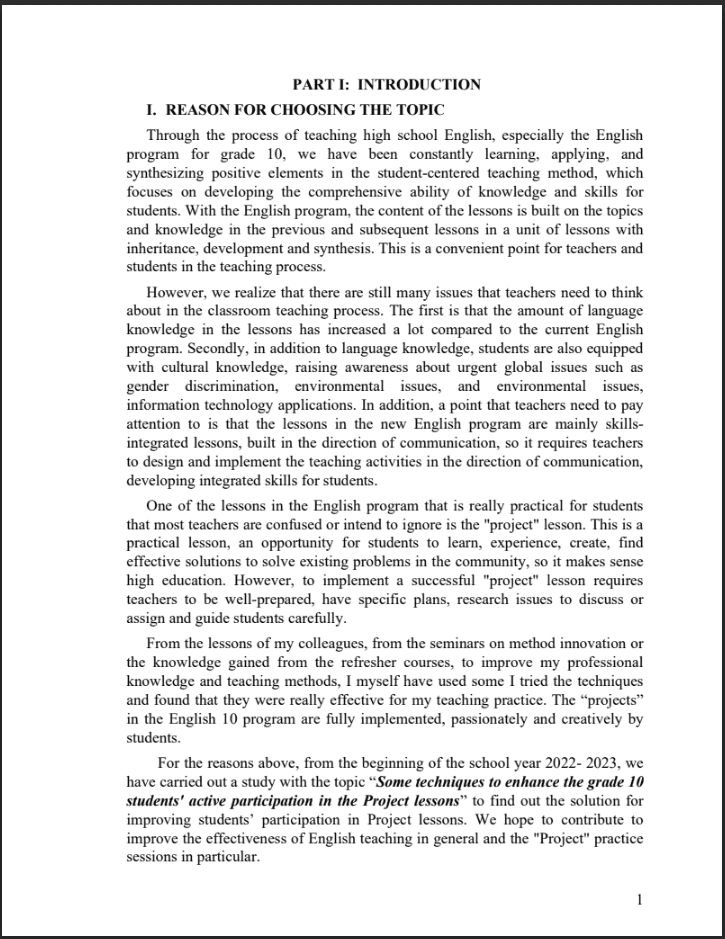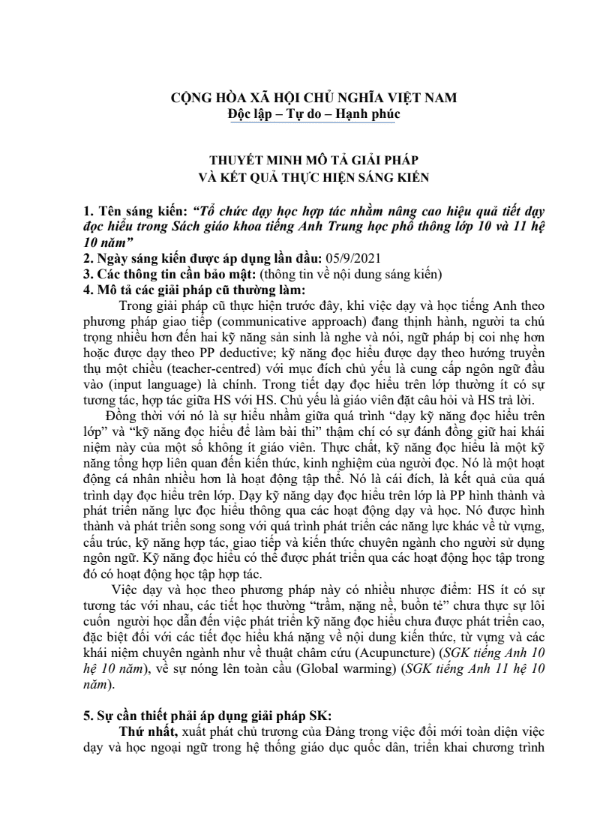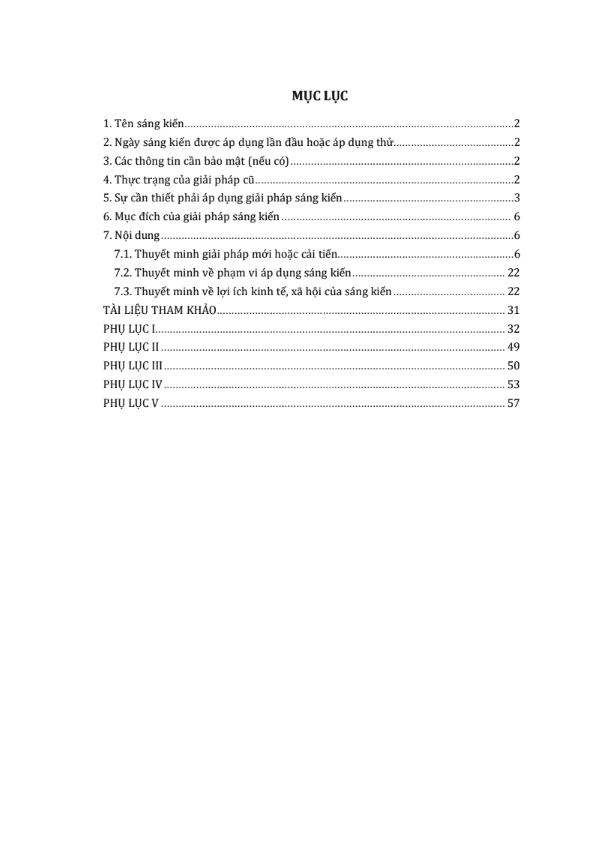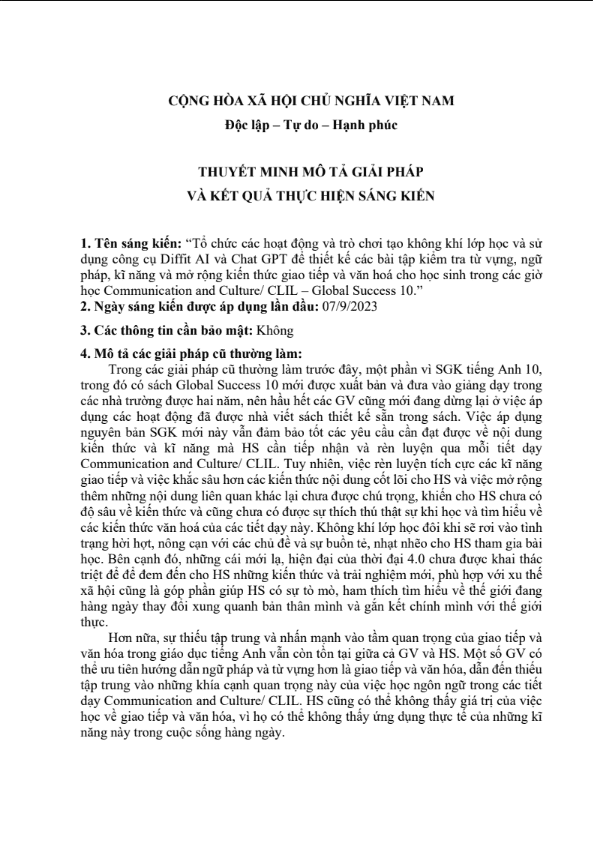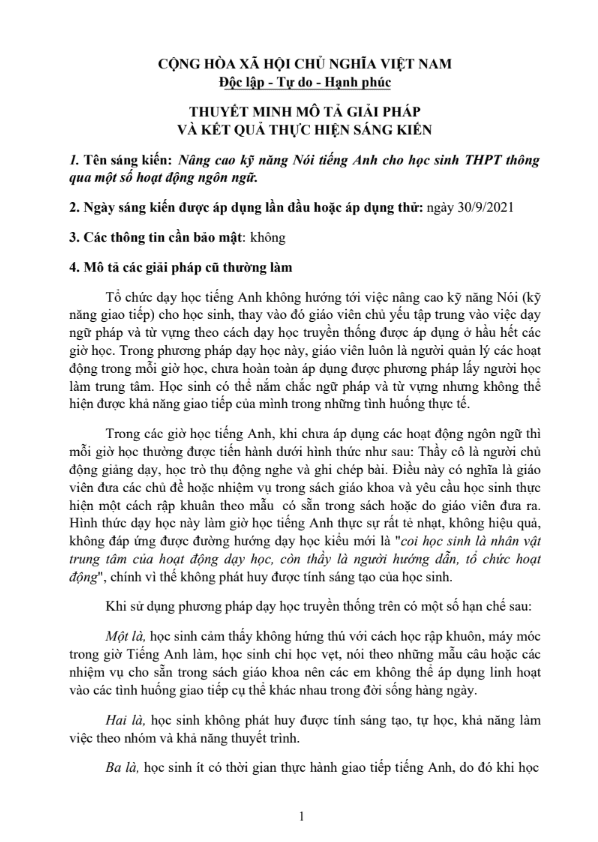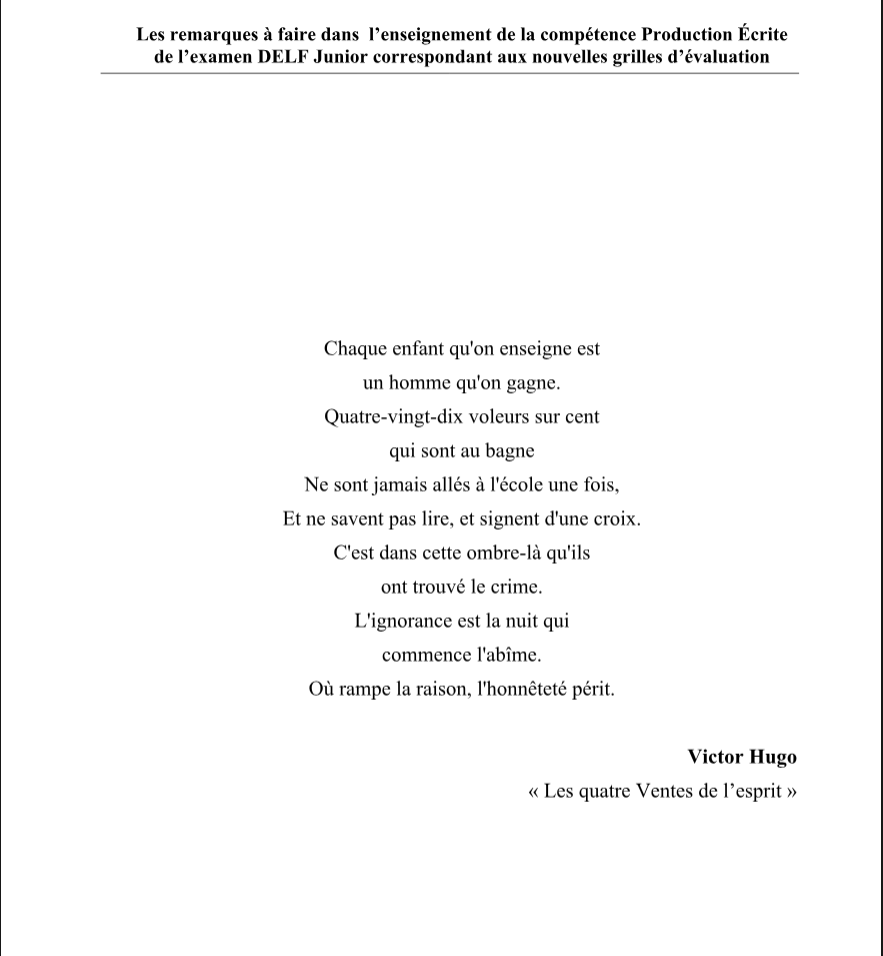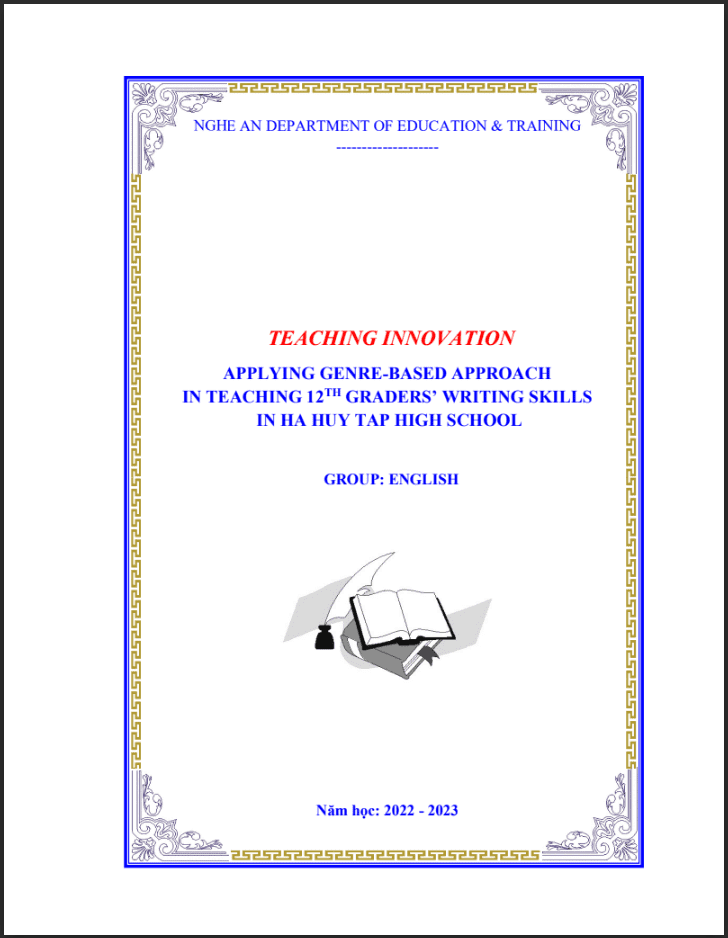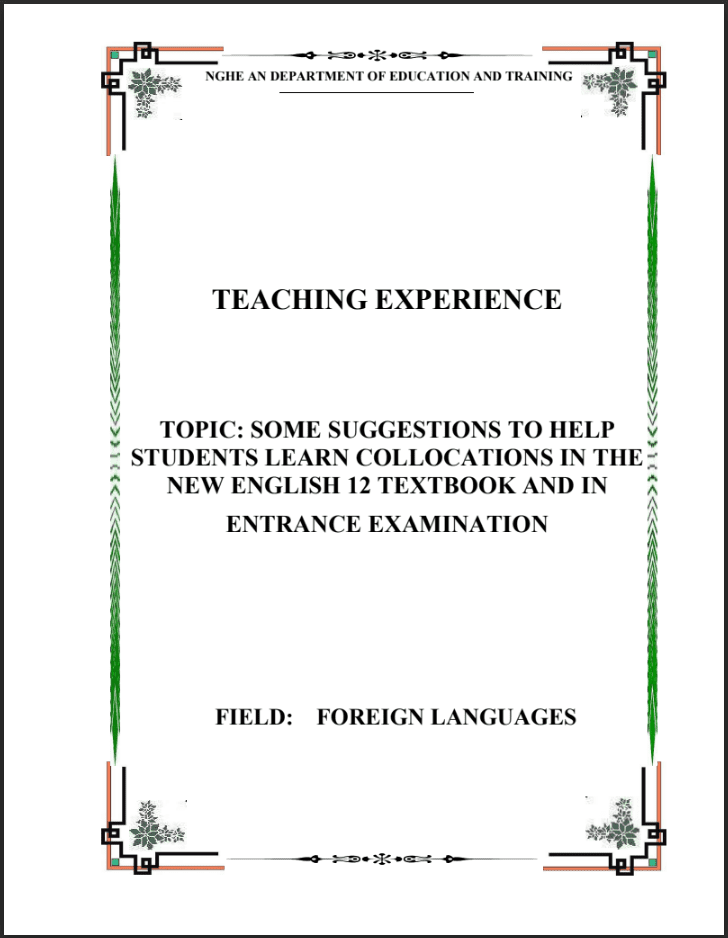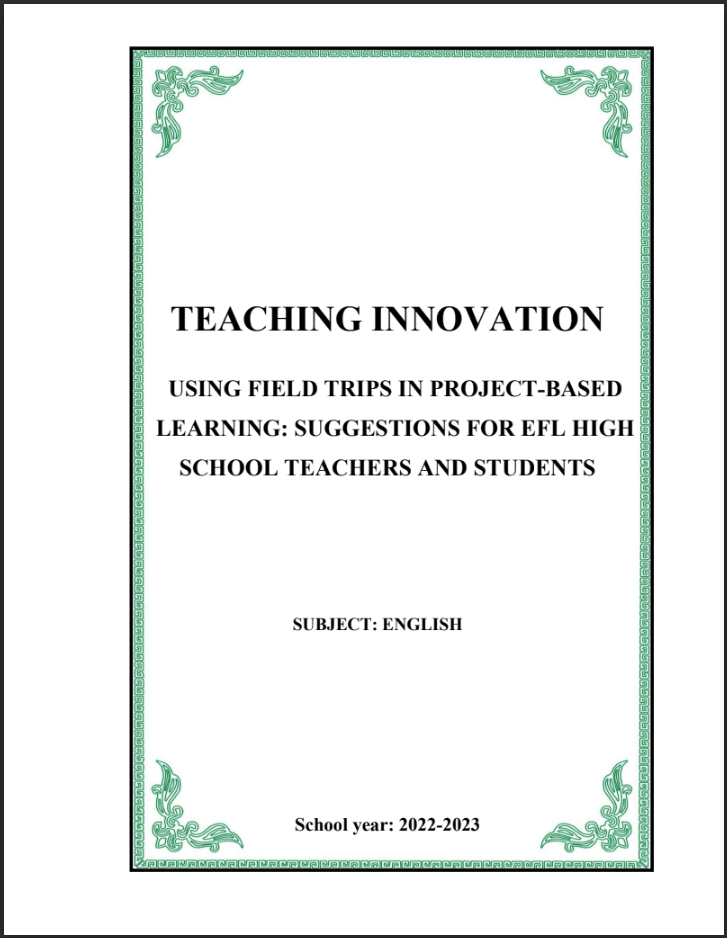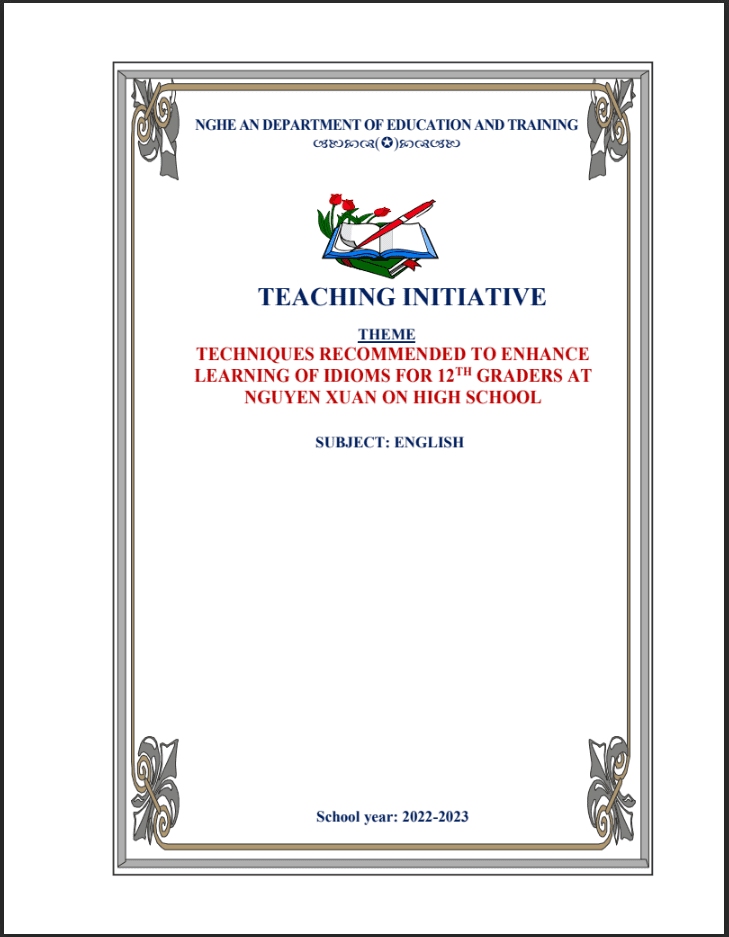SKKN Some techniques to enhance the grade 10 students’ active participation in the Project lessons
- Mã tài liệu: MP0075 Copy
| Môn: | Tiếng Anh |
| Lớp: | 10 |
| Bộ sách: | Global Success |
| Lượt xem: | 410 |
| Lượt tải: | 6 |
| Số trang: | |
| Tác giả: | Phạm Thị Minh Tâm |
| Trình độ chuyên môn: | Thạc sĩ giáo dục |
| Đơn vị công tác: | THPT Nguyễn Xuân Ôn |
| Năm viết: | 2022-2023 |
| Số trang: | |
| Tác giả: | Phạm Thị Minh Tâm |
| Trình độ chuyên môn: | Thạc sĩ giáo dục |
| Đơn vị công tác: | THPT Nguyễn Xuân Ôn |
| Năm viết: | 2022-2023 |
Sáng kiến kinh nghiệm “Some techniques to enhance the grade 10 students’ active participation in the Project lessons”triển khai gồm các biện pháp nổi bật sau:
Mô tả sản phẩm
PART I: INTRODUCTION
- REASON FOR CHOOSING THE TOPIC
Through the process of teaching high school English, especially the English program for grade 10, we have been constantly learning, applying, and synthesizing positive elements in the student-centered teaching method, which focuses on developing the comprehensive ability of knowledge and skills for students. With the English program, the content of the lessons is built on the topics and knowledge in the previous and subsequent lessons in a unit of lessons with inheritance, development and synthesis. This is a convenient point for teachers and students in the teaching process.
However, we realize that there are still many issues that teachers need to think about in the classroom teaching process. The first is that the amount of language knowledge in the lessons has increased a lot compared to the current English program. Secondly, in addition to language knowledge, students are also equipped with cultural knowledge, raising awareness about urgent global issues such as gender discrimination, environmental issues, and environmental issues, information technology applications. In addition, a point that teachers need to pay attention to is that the lessons in the new English program are mainly skills-integrated lessons, built in the direction of communication, so it requires teachers to design and implement the teaching activities in the direction of communication, developing integrated skills for students.
One of the lessons in the English program that is really practical for students that most teachers are confused or intend to ignore is the “project” lesson. This is a practical lesson, an opportunity for students to learn, experience, create, find effective solutions to solve existing problems in the community, so it makes sense high education. However, to implement a successful “project” lesson requires teachers to be well-prepared, have specific plans, research issues to discuss or assign and guide students carefully.
From the lessons of my colleagues, from the seminars on method innovation or the knowledge gained from the refresher courses, to improve my professional knowledge and teaching methods, I myself have used some I tried the techniques and found that they were really effective for my teaching practice. The “projects” in the English 10 program are fully implemented, passionately and creatively by students.
For the reasons above, from the beginning of the school year 2022- 2023, we have carried out a study with the topic “Some techniques to enhance the grade 10 students’ active participation in the Project lessons” to find out the solution for improving students’ participation in Project lessons. We hope to contribute to improve the effectiveness of English teaching in general and the “Project” practice sessions in particular.
- AIMS, SCOPE AND RESEARCH METHOD
- Aims:
– Help students develop language skills and some necessary skills for students, English program 10.
– Apply a number of methods of organizing the implementation of “Project”, creating interest in learning for students while improving the ability to work in groups and present for students.
– Help students take the initiative, react promptly to all communication situations
- Scope
– Applying in Project lessons – Tieng Anh 10 (Global Success)
- Research methods.
– Observational method: The teacher self-searches and researches the program of textbooks and reference books; conduct class visits of colleagues.
– Method of exchange and discussion: After attending the time with colleagues, being attended by colleagues, both conduct exchanges and discussions to draw out experiences for the lesson.
– Experimental method: The teacher conducts experimental teaching of some specific lectures.
– Control method: The teacher applies a variety of methods to organize activities in different pairs and groups, comparing the performance results with lessons that are performed only in one form.
PART II: CONTENT
- THEORETICAL BACKGROUND
- The definition of Project-based teaching and learning
Many definitions of project-based learning have been proposed by various authors. Moss and Van Duzer define it as an instructional approach that contextualizes learning by presenting learners with problems to solve or products to develop. As is discussed in, project-based learning (PBL) is a model that organizes learning around projects which are complex tasks, based on challenging questions or problems, involving students in design, problem-solving, decision making, or investigative activities; giving students the opportunity to work relatively autonomously over extended periods of time; and culminating in realistic products or presentations. Project-based learning is a dynamic approach to teaching in which students explore real-world problems, issues and challenges, are inspired to obtain a deeper knowledge of the subjects they are studying and more likely to retain the knowledge gained through this approach far more readily than through traditional textbook-centered learning. In addition, the students develop confidence and self-direction as they move through both team-based and independent work. PBL shifts away from the instruction of teacher-centeredness to that of student-centeredness. The purpose of PBL is to foster students’ abilities for lifelong learning through contextualizing learning by presenting them with problems to solve and/or artifacts to create; in doing so, students’ motivation and enthusiasm, their problem-solving abilities, research skills, sense of collaborations, resource management skills, longing for communication and information sharing, and language use awareness are progressively evident, and more important, such a process of engaging in various levels of projects may turn their life experiences to advantage. In language instruction, PBL is a flexible methodology allowing multiple skills to be developed in an integrated, meaningful, ongoing activity. Beckett states that projects are generally thought of as a long-term (several weeks) activity which are part of an instructional method which promotes the simultaneous acquisition of language, content, and skills. A major goal of project-based instruction is comprehensible output which generally occurs both during the project and as the final product of the project. The variety of definitions has provided the features of PBL. Thomas proposes the five criteria of project-based learning: centrality, driving question, constructive investigations, autonomy, and realism.
TÀI LIỆU LIÊN QUAN
- 7
- 105
- 1
- [product_views]
- 5
- 173
- 2
- [product_views]
- 4
- 165
- 3
- [product_views]
- 4
- 129
- 4
- [product_views]
100.000 ₫
- 6
- 434
- 5
- [product_views]
100.000 ₫
- 2
- 507
- 6
- [product_views]
100.000 ₫
- 9
- 546
- 7
- [product_views]
100.000 ₫
- 4
- 409
- 8
- [product_views]
100.000 ₫
- 2
- 595
- 9
- [product_views]
100.000 ₫
- 0
- 538
- 10
- [product_views]

